

Senator Ted Cruz thinks net neutrality will stop cable companies from being 'bold, innovative, and fair' Senator Ted Cruz (R-TX) had perhaps the most memorable reaction to Obama's Monday announcement about net neutrality: reclassifying broadband under common carrier laws was "Obamacare for the internet.
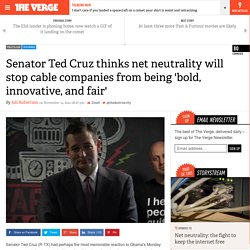
" Beyond the fact that Cruz hates both these things, the comparison didn't make a lot of sense, but it was good enough for him to elaborate upon at length today in a speech at Austin incubator Capital Factory. Yes, we'll all be using rotary phones The talk, which laid out a four-point "future of the internet" platform, was peppered with folksy and familiar rhetoric. Ted Cruz thinks an internet sales tax would hurt new entrepreneurs if, say, "you formed a company and you wanted to make retro lava lamps. " He supports ICANN, the US-based group that manages the internet's domain name system, and opposes giving the UN or any international group more control. The problem is that "bold, innovative, and fair" aren't words that come to mind when you think of today's unregulated ISPs.
Big companies like UPS and Visa are quietly pushing for net neutrality. The Ad Hoc Telecommunications Users Committee is about as vague of a name as you can imagine for a trade group.
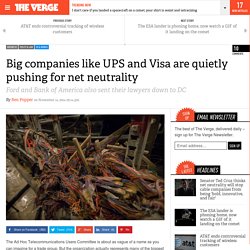
But the organization actually represents many of the biggest Fortune 500 companies in the US, and according to a report from Bloomberg, it has been petitioning the FCC on the topic of "Protecting and Promoting the Open Internet. " In an ex-parte notice filed with the FCC, Ad Hoc joined President Obama in calling for the use of Title II, arguing that the current system for providing residential internet service is a "terminating access monopoly" without meaningful competition. Terminating access monopolies Lawyers from Ford, Visa, UPS, and Bank of America all attended the Ad Hoc meeting with the FCC, although none of those companies would openly discuss support of Title II. In fact Ford, when asked by Bloomberg, outright denied that it was advocating for Title II. La neutralité du net expliquée par des pornstars.
Est-ce que l’on comprend mieux des sujets complexes lorsque c’est expliqué par une femme toute nue?
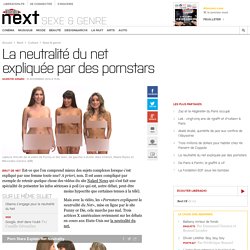
A priori, non. Obama prône l'adoption de règles strictes pour un internet "libre et ouvert" La proposition du président vise à rejeter certains accords selon lesquels des fournisseurs de contenu, comme Netflix, devraient payer des sommes énormes à des câblo-opérateurs pour permettre une connexion plus rapide pour leurs clients.
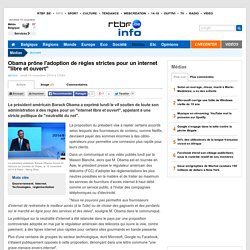
Dans un communiqué et une vidéo publiés lundi par la Maison Blanche, alors que M. Obama est en tournée en Asie, le président presse le régulateur américain des télécoms (FCC) d'adopter les réglementations les plus neutres possibles en la matière et de traiter au maximum les services de fourniture d'accès internet à haut débit comme un service public, à l'instar des compagnies téléphoniques ou d'électricité.
"Nous ne pouvons pas permettre aux fournisseurs d'internet de restreindre le meilleur accès (à la Toile) ou de choisir des gagnants et des perdants sur le marché en ligne pour des services et des idées", souligne M. Obama dans le communiqué. Obama s'engage pour la neutralité du Net. What can Obama really do for net neutrality? Net neutrality might be the most contentious problem the Federal Communications Commission has faced in recent history.
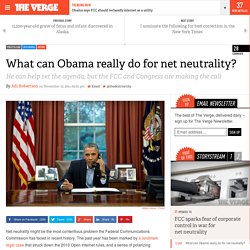
The past year has been marked by a landmark legal case that struck down the 2010 Open Internet rules, and a series of polarizing proposals for new ones. Protestors have driven a record number of comments to the FCC; this morning, a group blocked off Chairman Tom Wheeler's driveway to decry the latest series of rules. And now, President Barack Obama has urged the FCC to take a stand and treat broadband more like a utility than a web portal. New York Speaks: A Hearing on Our Rights to Connect and Communicate on Livestream. Verizon's Plan to Break the Internet. Verizon has a big plan for the Internet.
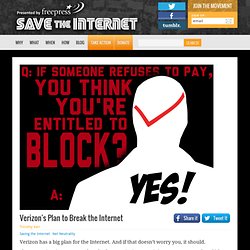
And if that doesn’t worry you, it should. The company is trying to overturn the Federal Communications Commission’s Open Internet Order, which prevents Internet service providers from blocking, throttling or otherwise discriminating against online content. And in court last Monday, Verizon lawyer Helgi Walker made the company’s intentions all too clear, saying the company wants to prioritize those websites and services that are willing to shell out for better access.
She also admitted that the company would like to block online content from those companies or individuals that don’t pay Verizon’s tolls. In other words, Verizon wants to control your online experience and make the Internet more like cable TV, where your remote offers only the illusion of choice. This approach would undermine Net Neutrality, the principle that allows us to connect and communicate online without interference. A la Une. Don't Say We Didn't Warn You: The Internet Slowdown Is Coming … If you’re reading this you probably already know that the fight for Net Neutrality is coming to a head.
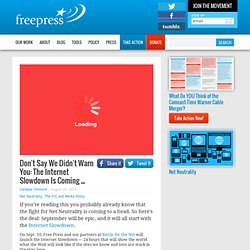
So here’s the deal: September will be epic, and it will all start with the Internet Slowdown. On Sept. 10, Free Press and our partners at Battle for the Net will launch the Internet Slowdown — 24 hours that will show the world what the Web will look like if the sites we know and love are stuck in the slow lane. This is going to be huge, and we want you to be part of it. FCC Chairman Tom Wheeler’s proposal to allow discrimination online is a disaster.
Everyone from the companies to the artists to Congress to the president knows that we need real Net Neutrality to prevent broadband providers from discriminating against content or applications. When Wheeler released his proposal earlier this year, support for his plan was scarce. Four months later, support for Wheeler’s plan is basically nonexistent. So consider yourself warned: The Internet Slowdown is coming. Des parlementaires américains tentent de sauver la neutralité du net. Les vifs débats autour de la neutralité du net vont-ils pousser Washington à enfin réagir ?
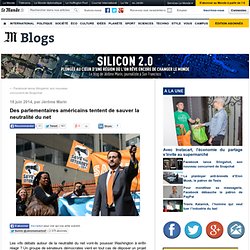
Un groupe de sénateurs démocrates vient en tout cas de déposer un projet de loi pour sauver ce principe garantissant une égalité de traitement entre tous les acteurs du web. Celui-ci est menacé par un nouveau cadre réglementaire, actuellement en discussions au sein de la Federal Communications Commission (FCC), le gendarme américain des télécoms. "Les Américains se sont clairement exprimés", indique Patrick Leahy, sénateur du Vermont.
Ces dernières semaines, plus de 120.000 personnes ont participé au débat public ouvert par la FCC. Accès préférentiel, fin de l’illimité, hausse des prix… le scénario noir pour l’Internet aux Etats-Unis. How many of your neighbors care about net neutrality? Find out here. By T.C.
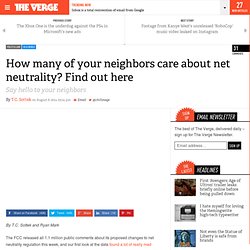
Sottek and Ryan Mark The FCC released all 1.1 million public comments about its proposed changes to net neutrality regulation this week, and our first look at the data found a lot of really mad people. Today we're taking a look at where most of those comments came from across the United States, in big cities and small ones. But first, you can see how many of your neighbors commented. Use the map above to see which regions of the US commented the most, or the zip code lookup tool below to see a specific area in the United States.
Look up the number of comments submitted in your neighborhood The big cities So which US city was the loudest in the net neutrality debate? Data sampled from neighborhoods with at least 1,000 residents in cities with at least 100,000 residents. Neutralité du Net : Google sort enfin de son silence. La neutralité du Net pour les nuls.